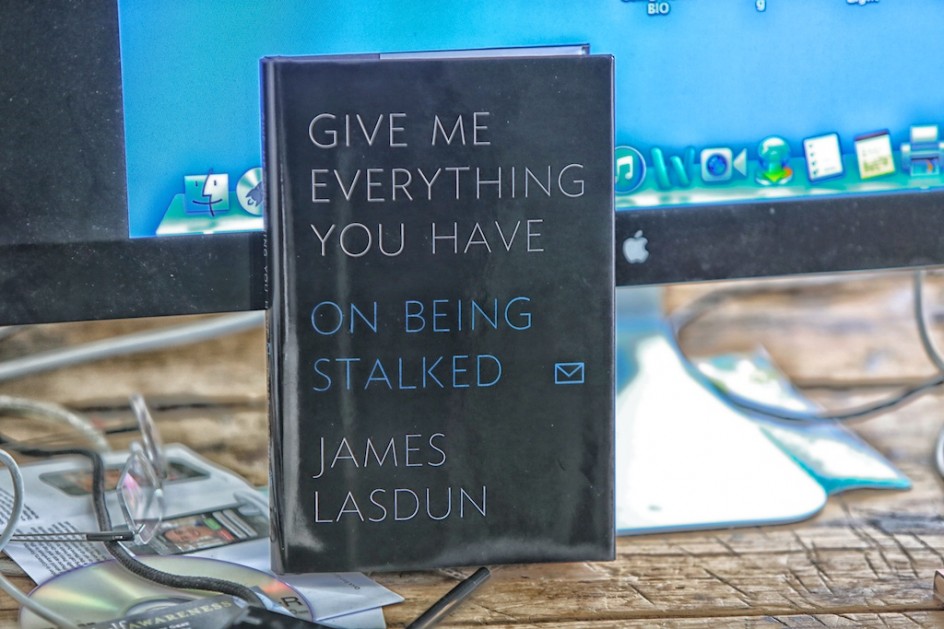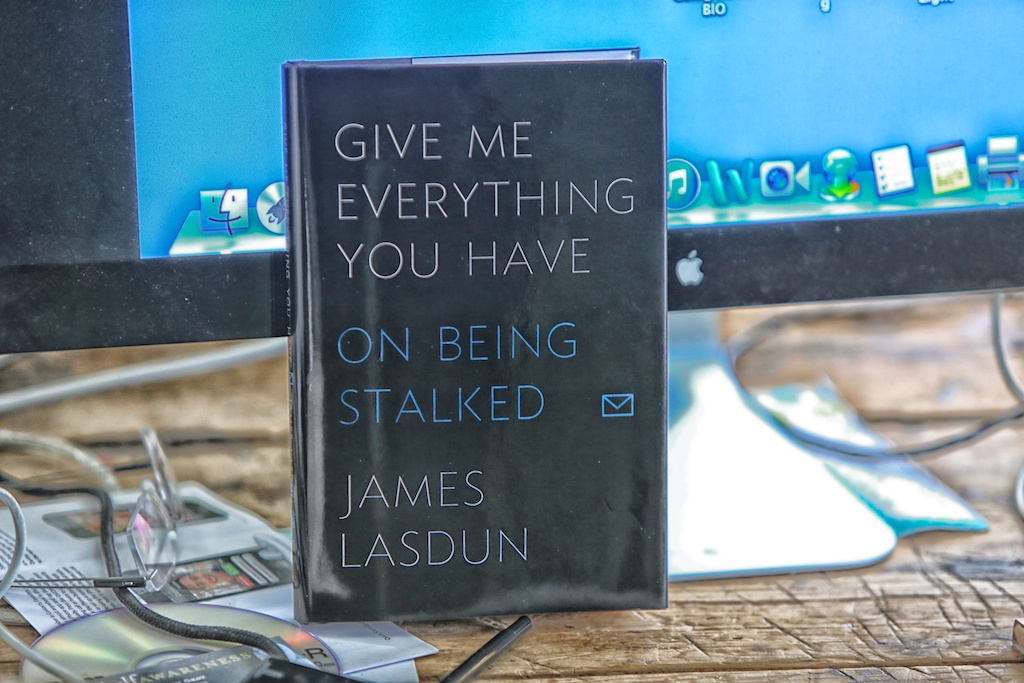
I bought this much praised, much publicized book (“Give Me Everything You Have: On Being Stalked”) from Battenkill Books. The author has been all over NPR and drawn many gushing blurbs from literary people. I know something about stalking, so I was thinking I might review it. James Lasdun has written a very literary, powerfully written story about being stalked by one of his former writing students. Nasdeen (not her real name) has sent him an obsessive stream of vile and abusive messages, posted accusations of plagiarism and misconduct on websites, wrote hateful and horrible anti-semitic e-mails to his employes and colleagues, even wrote about his family. This, according to Lasdun, has gone on for five years and goes on still. The jacket says the experience has been “harrowing,” and “terrifying” for him. I’ve decided not to review it, but write about the experience of stalking.
I well understand why it is getting so much attention. Anybody who has been victimized on the Internet is something of a hero in America.The journalism and publishing worlds are obsessed with the Internet, alternately hysterical and phobic about it, as it has been displacing them for a long time. And in their own way, they have been stalking it for some time. The scions of media and publishing might argue and be skeptical about everything else in the world, but there is no bad thing about the digital age they will hesitate to promote, pass on and sound the alarm about. They will herald almost any story about predators, pornographers, hackers, scam artists, identity thieves and stalkers. Most Americans still do not know that their children are more likely to have a 747 fall out of the sky onto their heads than be harmed as the result of being online. When is the last book or NPR interview you heard about the good things that can happen online.
There is a lot to be troubled about in this book – Lasdun permits this student to flirt with him, meets with her in a cafe to help get her novel published, refers him to his agent, ignores hundreds of clearly inappropriate and overly familiar messages, communicates inappropriately with her for years and even long after she is writing disturbing messages about him, he is happy to read the latest drafts of her book. I was a professor for five years and e-mail like that from students present or past would have set off all kinds of alarms in my head.
The story is murky. Nobody’s real name is used, and hardly anyone but him with a real name is ever quoted. Lasdun claims utter helplessness and victimization. Nobody could help him over those five years – the police didn’t care, lawyers had no solutions to offer, and if they had, he couldn’t afford them. University administrators were stumped and helpless, e-mails can’t be blocked or filtered. Lasdun seemed to lurch from rationalization to rationalization. Understandably, he felt as if his reputation and career were both being destroyed, (as well as his peace of mind) but obviously, but as it turns out neither were – he has a new book out from Farrar, Straus, Giroux, all kinds of breathless and admiring interviews in classy places, and many dire warnings from famous writers about the ease with which reputations and lives are destroyed on the scary Internet. Nasdeen may have been seeking to ruin him, but she ended up getting him a big book and lots of publicity.
I never heard of James Lasdun before this book but now everybody knows his name. Nobel Laureate J.M. Coetzee said the book was a reminder of how, since the Internet “our peace can be troubled and our good name besmirched.” I’m not sure that has happened to James Lasdun.
I am sure Lasdun’s stalker is quite real, as is his discomfort, but I guess don’t get the story as he presents it. I should be feeling a lot of sympathy, but mostly, I feel queasy. By the time Lasdun ended up at the Wailing Wall in Jerusalem pondering ancient temples, anti-semitism and the Israeli-Palestinian conflict, I was lost. The dread Nasdeen had quite vanished from the story. But I don’t want to be trashing anybody else’s book, and I have to concede I just might be too personally affected to be unbiased.
I have been stalked a number of times, and the specter of it always hovers. My good name has been often besmirched, there are whole mailing lists and websites dedicated to saying awful and generally false things about me. In this world, honesty and truth don’t matter and no one is accountable for their words. Hostility is a bad thing about the Internet, even though it was not created on the Internet. Two of my stalkers were very real, very much in the physical world, one of them was hospitalized and then jailed after she was found with scrapbooks containing hundreds, perhaps thousands of photos taken inside my house, of me walking my dogs. She tried to break into Bedlam Farm to take more photos, perhaps grab one of my dogs, but Rose’s barking alerted me to her (we were up on the hill herding sheep) and she fled, and was caught shortly after that near Bedlam Farm.
She had followed me for a couple of years, called me from jail regularly to say hi, is free and seems to be doing well now. She was a school teacher. Another would be novelist – enraged that I would not read her manuscript – went away hundreds of angry messages, and then a lawyer’s letter. A third stopped e-mailing me a dozen times a day after after the police called her up and threatened her with arrest.
I’ve had several especially vicious and determined online stalkers, some who set up websites calling me all sorts of evil names and attributing many evil thoughts and deeds to me and making all kinds of completely fictional accusations about me. One was careful to send copies of her messages to anyone I mentioned or who she thought might know me. That is a common tactic of stalkers – to attack people you know as well as you. Almost everyone close to me has gotten one hateful, disturbing or bizarre message after another from a stalker. Nobody I know has ever believed any messages from stalkers, and none, so far as I know, has done me any real harm, unless you count being unnerved. As it happens, none of them are nearly as determined to spoil my life as I am to live it.
Some stalkers are quite intuitive, they relate very closely to my work and have a good instinct for how to cause pain and discomfort. They can definitely make me uneasy. That is their biggest danger, really. Nobody really believes anything a stalker says. Hollywood stalkers are more dangerous, they work in the physical world, most online stalkers are usually cowardly and ill. They love the Internet because it is not the real world, the same as nasty e-mailers. Stalkers are not frightening to me. They are frightened and disturbed. They are the saddest of people, and many of them cannot get the help they need, a commentary on us.
But the truth is, they are not difficult to stop, at least not in my experience, they do not make me hate or fear the Internet. I did have to take a federally-sponsored course in online safety for celebrities and it was useful. The bottom line: Never, ever, engage in any personal messaging with people you don’t know. That was pretty much my instinct, and I have followed it. There is not a day where I do not get messages from people demanding that I speak to them, promising to visit my home, rage at me for not calling them up and talking to them, advising them about their dogs or insisting that I help them get their books published. This week, a woman from Poland said she was coming to the United States to visit the country and to find my farm and meet with me, and if I did not agree, she would cause me great harm. I will not respond. Of course.
I live an open life, and will not give that up. If stalkers get into your head, they win. Otherwise, they lose, every time. Hiding from the world is just another form of slavery, like living for health care.
I do understand I have to be thoughtful. Any one of these strange daily messengers could become a stalker if I did not understand how to handle communications in the online world. If you pretend to be everyone’s friend, unhealthy people become enraged when you are not friendly. That’s how stalking works, as a general rule. Unlike James Lasdun, I have always found help in dealing with them. The police will respond, there are things lawyers can do, online mail hosts are especially sensitive to allegations of harassment and stalking and stalkers can easily be tracked. They can be fined, lose their computers and e-mail addresses, be jailed or committed. Courts are increasingly sensitive to online hostility, slander, and abuse, of which there is much.
But I have had a very different experience than James Lasdun. I really cannot imagine permitting myself to be stalked by someone for five years. I would head for Costa Rica first or go into hiding in the New Mexico desert. That kind of passivity is more frightening to me than losing my reputation. Lasdun says he couldn’t afford to fight Nasdeen. I can’t imagine that he could afford not to. I suppose that was my biggest problem with the book, which is certainly interesting. I have never met a stalker that powerful or clever or determined. Stalkers in my experience have short attention spans, there are lots of people out there to stalk. (I read this book with the idea of helping Connie Brooks sell some, and don’t hesitate. It’s an interesting read. You might have a different response than I did. If anyone wishes to buy it, it is a fascinating book in many ways and you can call Battenkill Books to get it: 518 677-2515.)
My own feeling is that the world is filled with dangers, online and off. A bullet grazed my arm during a labor riot in Atlantic City, a mob torched my car while I was sitting in it during a race riot in Philadelphia, I was knifed by a rampaging gang in Washington, I saw the body of a small child murdered and raped in Boston, saw many bodies dismembered in accidents, burned in fires. Online stalkers do not frighten me much, they are not the scariest things in the world. If all else fails, you can just delete the messages.
Disturbed people have access to celebrities in a very new way. So do healthy people. Social media promotes the idea that if you are on Facebook, you are everyone’s friend and you can talk to them and be available. That cannot be so, I cannot be friends with thousands of strangers, and I have learned to respect those boundaries. I am sorry James Lasdun was not able to protect himself and his family, silence his stalker and move on. Perhaps his book will help him to do it.

